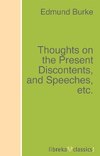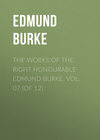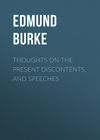Loe raamatut: «Selections from the Speeches and Writings of Edmund Burke», lehekülg 32
WILKES AND RIGHT OF ELECTION
In the last session, the corps called the "king's friends" made a hardy attempt, all at once, TO ALTER THE RIGHT OF ELECTION ITSELF; to put it into the power of the House of Commons to disable any person disagreeable to them from sitting in parliament, without any other rule than their own pleasure; to make incapacities, either general for descriptions of men, or particular for individuals; and to take into their body, persons who avowedly never been chosen by the majority of legal electors, nor agreeably to any known rule of law.
The arguments upon which this claim was founded and combated, are not my business here. Never has a subject been more amply and more learnedly handled, nor upon one side, in my opinion, more satisfactorily; they who are not convinced by what is already written would not receive conviction THOUGH ONE AROSE FROM THE DEAD.
I too have thought on this subject: but my purpose here, is only to consider it as a part of the favourite project of government; to observe on the motives which led to it; and to trace its political consequences.
A violent rage for the punishment of Mr. Wilkes was the pretence of the whole. This gentleman, by setting himself strongly in opposition to the court cabal, had become at once an object of their persecution, and of the popular favour. The hatred of the court party pursuing, and the countenance of the people protecting him, it very soon became not at all a question on the man, but a trial of strength between the two parties. The advantage of the victory in this particular contest was the present, but not the only, nor by any means the principal, object. Its operation upon the character of the House of Commons was the great point in view. The point to be gained by the cabal was this; that a precedent should be established, tending to show, THAT THE FAVOUR OF THE PEOPLE WAS NOT SO SURE A ROAD AS THE FAVOUR OF THE COURT EVEN TO POPULAR HONOURS AND POPULAR TRUSTS. A strenuous resistance to every appearance of lawless power; a spirit of independence carried to some degree of enthusiasm; an inquisitive character to discover, and a bold one to display, every corruption and every error of government; these are the qualities which recommend a man to a seat in the House of Commons, in open and merely popular elections. An indolent and submissive disposition; a disposition to think charitably of all the actions of men in power, and to live in a mutual intercourse of favours with them; an inclination rather to countenance a strong use of authority, than to bear any sort of licentiousness on the part of the people; these are unfavourable qualities in an open election for members of parliament. The instinct which carries the people towards the choice of the former, is justified by reason; because a man of such a character, even in its exorbitances, does not directly contradict the purposes of a trust, the end of which is a control on power. The latter character, even when it is not in its extreme, will execute this trust but very imperfectly; and, if deviating to the least excess, will certainly frustrate instead of forwarding the purposes of a control on government. But when the House of Commons was to be new modelled, is principle was not only to be changed but reversed. Whilst any errors committed in support of power were left to the law, with every advantage of favourable construction, of mitigation, and finally of pardon: all excesses on the side of liberty, or in pursuit of popular favour, or in defence of popular rights and privileges, were not only to be punished by the rigour of the known law, but by a DISCRETIONARY proceeding, which brought on THE LOSS OF THE POPULAR OBJECT ITSELF. Popularity was to be rendered, if not directly penal, at least highly dangerous. The favour of the people might lead even to a disqualification of representing them. Their odium might become, strained through the medium of two or three constructions, the means of sitting as the trustee of all that was dear to them. This is punishing the offence in the offending part. Until this time, the opinion of the people, through the power of an assembly, still in some sort popular, led to the greatest honours and emoluments in the gift of the crown. Now the principle is reversed; and the favour of the court is the only sure way of obtaining and holding those honours which ought to be in the disposal of the people.
It signifies very little how this matter may be quibbled away. Example, the only argument of effect in civil life, demonstrates the truth of my proposition. Nothing can alter my opinion concerning the pernicious tendency of this example, until I see some man for his indiscretion in the support of power, for his violent and intemperate servility, rendered incapable of sitting in parliament. For as it now stands, the fault of overstraining popular qualities, and, irregularly if you please, asserting popular privileges, has led to disqualification; the opposite fault never has produced the slightest punishment. Resistance to power has shut the door of the House of Commons to one man; obsequiousness and servility, to none.
Not that I would encourage popular disorder, or any disorder. But I would leave such offences to the law, to be punished in measure and proportion. The laws of this country are for the most part constituted, and wisely so, for the general ends of government, rather than for the preservation of our particular liberties. Whatever, therefore, is done in support of liberty, by persons not in public trust, or not acting merely in that trust, is liable to be more or less out of the ordinary course of the law; and the law itself is sufficient to animadvert upon it with great severity. Nothing indeed can hinder that severe letter from crushing us, except the temperaments it may receive from a trial by jury. But if the habit prevail OF GOING BEYOND THE LAW, and superseding this judicature, of carrying offences, real or supposed, into the legislative bodies, who shall establish themselves into COURTS OF CRIMINAL EQUITY (so THE STAR CHAMBER has been called by Lord Bacon), all the evils of the STAR CHAMBER are revived. A large and liberal construction in ascertaining offences, and a discretionary power in punishing them, is the idea of CRIMINAL EQUITY; which is in truth a monster in jurisprudence. It signifies nothing whether a court for this purpose be a committee of council, or a house of commons, or a house of lords; the liberty of the subject will be equally subverted by it. The true end and purpose of that house of parliament which entertains such a jurisdiction, will be destroyed by it. I will not believe, what no other man living believes, that Mr. Wilkes was punished for the indecency of his publications, or the impiety of his ransacked closet. If he had fallen in a common slaughter of libellers and blasphemers, I could well believe that nothing more was meant than was pretended. But when I see, that, for years together, full as impious, and perhaps more dangerous, writings to religion, and virtue, and order, have not been punished, nor their authors discountenanced; that the most audacious libels on royal majesty have passed without notice; that the most treasonable invectives against the laws, liberties, and constitution of the country, have not met with the slightest animadversion; I must consider this as a shocking and shameless pretence. Never did an envenomed scurrility against everything sacred and civil, public and private, rage through the kingdom with such a furious and unbridled licence. All this while the peace of the nation must be shaken, to ruin one libeller, and to tear from the populace a single favourite.
Nor is it that vice merely skulks in an obscure and contemptible impunity. Does not the public behold with indignation, persons not only generally scandalous in their lives, but the identical persons who, by their society, their instruction, their example, their encouragement, have drawn this man into the very faults which have furnished the cabal with a pretence for his persecution, loaded with every kind of favour, honour, and distinction, which a court can bestow? Add but the crime of servility (the foedum crimen servitutis) to every other crime, and the whole mass is immediately transmuted into virtue, and becomes the just subject of reward and honour. When therefore I reflect upon this method pursued by the cabal in distributing rewards and punishments, I must conclude that Mr. Wilkes is the object of persecution, not on account of what he has done in common with others who are the objects of reward, but for that in which he differs from many of them: that he is pursued for the spirited dispositions which are blended with his vices; for his unconquerable firmness, for his resolute, indefatigable, strenuous resistance against oppression.
In this case, therefore, it was not the man that was to be punished, nor his faults that were to be discountenanced. Opposition to acts of power was to be marked by a kind of civil proscription. The popularity which should arise from such an opposition was to be shown unable to protect it. The qualities by which court is made to the people, were to render every fault inexpiable, and every error irretrievable. The qualities by which court is made to power, were to cover and to sanctify everything. He that will have a sure and honourable seat in the House of Commons, must take care how he adventures to cultivate popular qualities; otherwise he may remember the old maxim, Breves et infaustos populi Romani amores. If, therefore, a pursuit of popularity expose a man to greater dangers than a disposition to servility, the principle which is the life and soul of popular elections will perish out of the constitution.
ROCKINGHAM AND CONWAY
It is now given out for the usual purposes, by the usual emissaries, that Lord Rockingham did not consent to the repeal of this act until he was bullied into it by Lord Chatham; and the reporters have gone so far as publicly to assert, in a hundred companies, that the honourable gentleman under the gallery, who proposed the repeal in the American committee, had another set of resolutions in his pocket directly the reverse of those he moved. These artifices of a desperate cause are at this time spread abroad, with incredible care, in every part of the town, from the highest to the lowest companies; as if the industry of the circulation were to make amends for the absurdity of the report. Sir, whether the noble lord is of a complexion to be bullied by Lord Chatham, or by any man, I must submit to those who know him. I confess, when I look back to that time, I consider him as placed in one of the most trying situations in which, perhaps, any man ever stood. In the House of Peers there were very few of the ministry, out of the noble lord's own particular connection (except Lord Egmont, who acted, as far as I could discern, an honourable and manly part), that did not look to some other future arrangement, which warped his politics. There were in both houses new and menacing appearances, that might very naturally drive any other, than a most resolute minister, from his measure or from his station. The household troops openly revolted. The allies of ministry (those, I mean, who supported some of their measures, but refused responsibility for any) endeavoured to undermine their credit, and to take ground that must be fatal to the success of the very cause which they would be thought to countenance. The question of the repeal was brought on by ministry in the committee of this house, in the very instant when it was known that more than one court negotiation was carrying on with the heads of the opposition. Everything, upon every side, was full of traps and mines. Earth below shook; heaven above menaced; all the elements of ministerial safety were dissolved. It was in the midst of this chaos of plots and counterplots; it was in the midst of this complicated warfare against public opposition and private treachery, that the firmness of that noble person was put to the proof. He never stirred from his ground: no, not an inch. He remained fixed and determined, in principle, in measure, and in conduct. He practised no managements. He secured no retreat. He sought no apology.
I will likewise do justice, I ought to do it, to the honourable gentlemen who led us in this house. Far from the duplicity wickedly charged on him, he acted his part with alacrity and resolution. We all felt inspired by the example he gave us, down even to myself, the weakest in that phalanx. I declare for one, I knew well enough (it could not be concealed from anybody) the true state of things; but, in my life, I never came with so much spirits into this house. It was a time for a MAN to act in. We had powerful enemies, but we had faithful and determined friends; and a glorious cause. We had a great battle to fight, but we had the means of fighting; not as now, when our arms are tied behind us. We did fight that day, and conquer.
I remember, Sir, with a melancholy pleasure, the situation of the honourable gentleman (General Conway.) who made the motion for the repeal; in that crisis when the whole trading interest of this empire, crammed into your lobbies, with a trembling and anxious expectation, waited, almost to a winter's return of light, their fate from your resolutions. When, at length, you had determined in their favour, and your doors, thrown open, showed them the figure of their deliverer in the well-earned triumph of his important victory, from the whole of that grave multitude there arose an involuntary burst of gratitude and transport. They jumped upon him like children on a long-absent father. They clung about him as captives about their redeemer. All England, all America joined to his applause. Nor did he seem insensible to the best of all earthly rewards, the love and admiration of his fellow-citizens. HOPE ELEVATED, AND JOY BRIGHTENED HIS CREST. I stood near him; and his face, to use the expression of the scripture of the first martyr, "his face was as if it had been the face of an angel." I do not know how others feel; but if I had stood in that situation, I never would have exchanged it for all that kings in their profusion could bestow. I did hope that that day's danger and honour would have been a bond to hold us all together for ever. But, alas! that, with other pleasing visions, is long since vanished.
Sir, this act of supreme magnanimity has been represented, as if it had been a measure of an administration, that having no scheme of their own, took a middle line, pilfered a bit from one side and a bit from the other. Sir, they took NO middle lines. They differed fundamentally from the schemes of both parties; but they preserved the objects of both. They preserved the authority of Great Britain. They made the Declaratory Act; they repealed the Stamp Act. They did both FULLY; because the Declaratory Act was without QUALIFICATION; and the repeal of the Stamp Act TOTAL. This they did in the situation I have described.
POLITICS IN THE PULPIT
It is plain that the mind of this POLITICAL preacher was at the time big with some extraordinary design; and it is very probable that the thoughts of his audience, who understood him better than I do, did all along run before him in his reflection, and in the whole train of consequences to which it led. Before I read that sermon, I really thought I had lived in a free country; and it was an error I cherished, because it gave me a greater liking to the country I lived in. I was indeed aware, that a jealous, ever-waking vigilance, to guard the treasure of our liberty, not only from invasion, but from decay and corruption, was our best wisdom, and our first duty. However, I considered that treasure rather as a possession to be secured, than as a prize to be contended for. I did not discern how the present time came to be so very favourable to all EXERTIONS in the cause of freedom. The present time differs from any other only by the circumstance of what is doing in France. If the example of that nation is to have an influence on this, I can easily conceive why some of their proceedings which have an unpleasant aspect, and are not quite reconcilable to humanity, generosity, good faith, and justice, are palliated with so much milky good-nature towards the actors, and born with so much heroic fortitude towards the sufferers. It is certainly not prudent to discredit the authority of an example we mean to follow. But allowing this, we are led to a very natural question:—What is that cause of liberty, and what are those exertions in its favour, to which the example of France is so singularly auspicious? Is our monarchy to be annihilated, with all the laws, all the tribunals, and all the ancient corporations of the kingdom? Is every land-mark of the country to be done away in favour of a geometrical and arithmetical constitution? Is the House of Lords to be voted useless? Is episcopacy to be abolished? Are the church lands to be sold to Jews and jobbers; or given to bribe new-invented municipal republics into a participation in sacrilege? Are all the taxes to be voted grievances, and the revenue reduced to a patriotic contribution, or patriotic presents? Are silver shoe-buckles to be substituted in the place of the land-tax and the malt-tax, for the support of the naval strength of this kingdom? Are all orders, ranks, and distinctions to be confounded, that out of universal anarchy, joined to national bankruptcy, three or four thousand democracies should be formed into eighty-three, and that they may all, by some sort of unknown attractive power, be organized into one? For this great end is the army to be seduced from its discipline and its fidelity, first by every kind of debauchery, and then by the terrible precedent of a donative in the increase of pay? Are the curates to be secluded from their bishops, by holding out to them the delusive hope of a dole out of the spoils of their own order? Are the citizens of London to be drawn from their allegiance by feeding them at the expense of their fellow-subjects? Is a compulsory paper currency to be substituted in the place of the legal coin of this kingdom? Is what remains of the plundered stock of public revenue to be employed in the wild project of maintaining two armies to watch over and to fight with each other? If these are the ends and means of the Revolution Society, I admit they are well assorted; and France may furnish them for both with precedents in point. I see that your example is held out to shame us. I know that we are supposed a dull, sluggish race, rendered passive by finding our situation tolerable, and prevented by a mediocrity of freedom from ever attaining to its full perfection. Your leaders in France began by affecting to admire, almost to adore, the British constitution; but, as they advanced, they came to look upon it with a sovereign contempt. The friends of your National Assembly amongst us have full as mean an opinion of what was formerly thought the glory of their country. The Revolution Society has discovered that the English nation is not free. They are convinced that the inequality in our representation is a"defect in our constitution SO GROSS AND PALPABLE, as to make it excellent chiefly in FORM and THEORY." (Discourse on the Love of our Country, 3rd edition page 39.) That a representation in the legislature of a kingdom is not only the basis of all constitutional liberty in it, but of "ALL LEGITIMATE GOVERNMENT; that without it a GOVERNMENT is nothing but a USURPATION;"—that "when the representation is PARTIAL, the kingdom possesses liberty only PARTIALLY; and if extremely partial it gives only a SEMBLANCE; and if not only extremely partial, but corruptly chosen, it becomes a NUISANCE." Dr. Price considers this inadequacy of representation as our FUNDAMENTAL GRIEVANCE; and though, as to the corruption of this semblance of representation, he hopes it is not yet arrived to its full perfection of depravity, he fears that "nothing will be done towards gaining for us this ESSENTIAL BLESSING, until some GREAT ABUSE OF POWER again provokes our resentment, or some GREAT CALAMITY again alarms our fears, or perhaps till the acquisition of a PURE AND EQUAL REPRESENTATION BY OTHER COUNTRIES, whilst we are MOCKED with the SHADOW, kindles our shame." To this he subjoins a note in these words. "A representation chosen chiefly by the treasury, and a FEW thousands of the DREGS of the people, who are generally paid for their votes."
You will smile here at the consistency of those democratists, who, when they are not on their guard, treat the humbler part of the community with the greatest contempt, whilst, at the same time, they pretend to make them the depositories of all power. It would require a long discourse to point out to you the many fallacies that lurk in the generality and equivocal nature of the terms "inadequate representation." I shall only say here, in justice to that old-fashioned constitution, under which we have long prospered, that our representation has been found perfectly adequate to all the purposes for which a representation of the people can be desired or devised. I defy the enemies of our constitution to show the contrary. To detail the particulars in which it is found so well to promote its ends, would demand a treatise on our practical constitution. I state here the doctrine of the revolutionists, only that you and others may see, what an opinion these gentlemen entertain of the constitution of their country, and why they seem to think that some great abuse of power, or some great calamity, as giving a chance for the blessing of a constitution according to their ideas, would be much palliated to their feelings; you see WHY THEY are so much enamoured of your fair and equal representation, which being once obtained, the same effects might follow. You see they consider our House of Commons as only "a semblance," "a form," "a theory," "a shadow," "a mockery," perhaps "a nuisance."




















